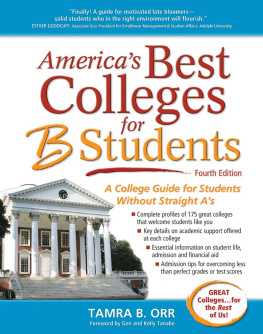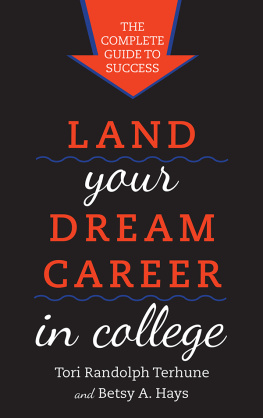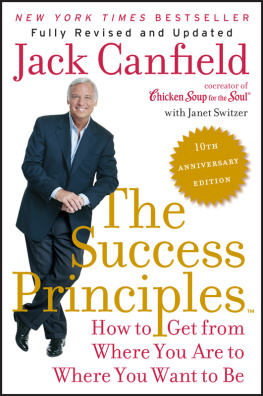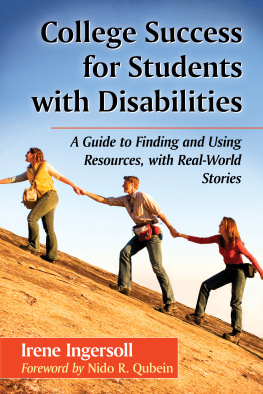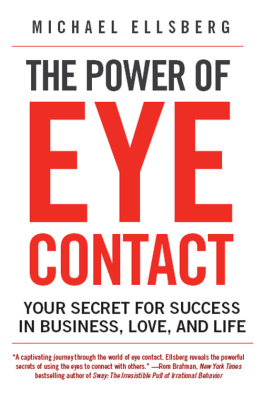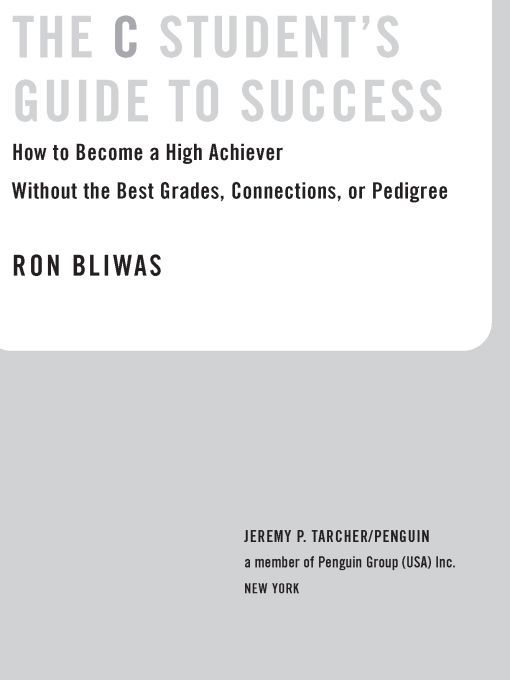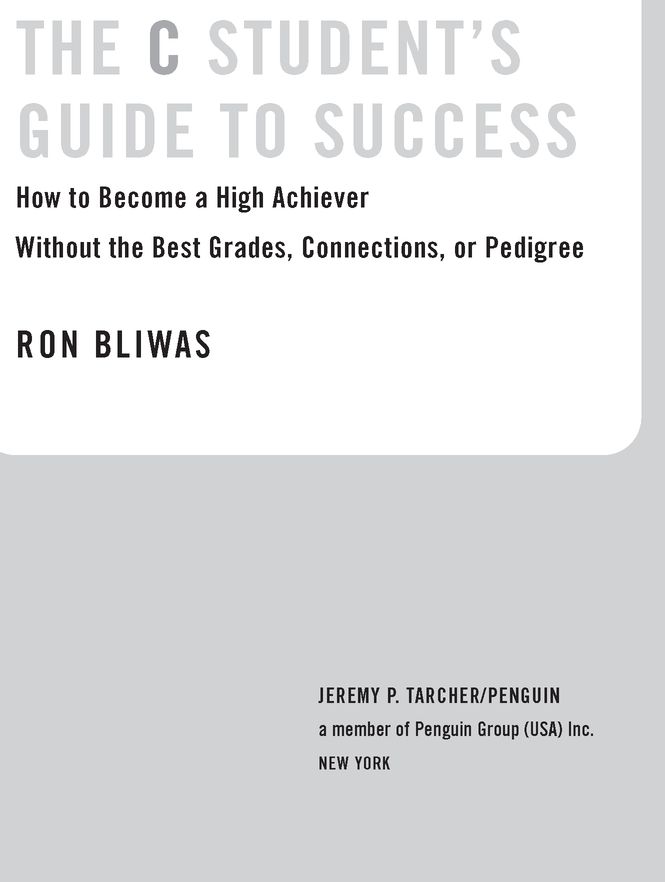Table of Contents
MORE ADVANCE PRAISE FOR THE C STUDENTS GUIDE TO SUCCESS
This book offers wisdom and advice that is applicable to everyone who endeavors for a successful career and honest, genuine relationships with coworkers. I can think of at least ten people to whom I plan to give this book, beginning with both my daughters, who are preparing to enter the workforce.
KELLY B. BROWNING, Executive Vice President, American Institute for Cancer Research
An inspiring and entertaining roadmap on how to succeed in business... and in life. The C Students Guide to Success is an excellent primer for anyone aspiring to a career in business. Ron Bliwas writes with deep insight and empathy for the majority of aspirants who dont have the advantages of birth and connections, who have to make it on their own through hard work, creativity, imagination, and a little bit of luck. Bliwass readable and personal tale lays out the principles of success from which all of us can benefit.
MICHAEL ALTER, President and CEO, Alter Group
The C Students Guide to Success is a must-read regardless of your career stage. Ron Bliwas provides practical anecdotes and solid advice that can be applied to any business. We are all C students in some areas of our personal and professional relationships and business competencies.
STEVE LACY, President and CEO, Meredith Corporation
If you werent number one in your class or placed on the fast track in your first job, this book is for you. Youll find tips on how to catch up and overtake, and insights on marketing yourself, that you wont find anywhere else.
SIR MARTIN SORRELL, CEO, WPP Group
This book is as brash, blunt, and practical as its author. It makes great reading for all students... whether you got As or Cs; whether you got them last month or two decades ago, I believe you will find the insights in this book refreshing and valuable.
SHELLY LAZARUS, CEO, Ogilvy & Mather
To my wife, Linda, who has provided me with the support, confidence, and love every C student needs to be successful;this book, let alone my career, would not have been possible without you.
INTRODUCTION
Some people are immediately coveted by employers after they graduate from college. They are the best and the brightest, students from top schools with great grades. Many of them know exactly what they want to do with their lives, and they have professors, family friends, and other well-connected people helping them achieve their goals. Right after graduating these rising stars find terrific positions with top corporations, and they never have a moment of doubt as they follow a prescribed career path.
Im not writing this book for these people.
Instead, Im writing for those of you who took the first job you could get and were grateful to get it. Or for those of you who took that first job, worked hard, and one day woke up and realized you were stuck in a job that was just okay. This book is also for you if youre still in school, approaching graduation, and wondering who in the world will hire you. And its for you if youve had a few false starts or failures and want to get on the right track.
In other words, Im writing for people like me. Though I am now an advertising agency CEO, I was an average student from the University of Arizona who grew up in Coraopolis, Pennsylvania. I could have used a book like this. It would have helped me to understand how to use my natural talentsmy storytelling ability, my relationship-building skillsto compete with those who were more academically accomplished or more polished than I was.
Career opportunities and strategies are different for people like you and me than for Harvard MBAs. When youre not viewed as the best of the best or lack a clear career path, you need an alternative approach. This book will provide one.
Let me explain how by telling you a bit about myself and how I came to write this book.
WORKING AT THE WRONG COMPANY IN THE WRONG POSITION FOR ALMOST NO MONEY
At first the job offer from H.J. Heinz in Pittsburgh seemed like a great opportunity. I was about to be married and needed to find a job, and the chance to start out in Heinzs training program sounded perfect. It was the first job offer I received, and I took it without a second thought.
I immediately was assigned to Heinzs baby food division, and my job consisted of traveling from store to store in Pennsylvania, opening up cases of Heinz baby food, and putting the jars on the shelves. Of course I didnt know beforehand that this was what I would be doing. On my first day of work I arrived in the supermarket parking lot in my brand-new suit. I looked and felt terrific, every inch the business executive on his way to the top. My supervisor met me and escorted me first into the supermarket and then the storeroom in back where boxes of baby food were piled to the ceiling. He told me to climb up and start handing them down. You want me to do that? I asked. The supervisor shook his head and gave me a look that let me know who I was: a naive twenty-one-year-old from the University of Arizona. I spent the morning handing down boxes and turning my beautiful suit into a dusty, dirty mess.
As demeaning and demoralizing as the work was, though, I would have stuck with it if I had been in the right place for someone like me. It soon became clear that I would never have a chance to succeed at H.J. Heinz.
One of my regular customers at Heinz was the largest volume grocery store in Pittsburgh. They also had one of the largest baby food sections of any store in the country, using this category as a loss leader (a strategy where products may lose money but achieve others marketing goals). The two men who owned the store did not have children to pass it on to, and they essentially adopted me. I always struck up a conversation with them when I visited their store. Though I was twenty-one and they must have been in their early sixties, I naturally found common ground with them and pretty soon my visits entailed going to their office, having coffee, and talking. They seemed to enjoy hearing about my life, and one day they made me a job offer.
I was honest with them. I explained that I hated the grocery business. Amazingly, they didnt mind that I had turned them down. In fact, they said they wanted to help me: What can we do for you? they asked. I suggested that they eliminate Heinzs two competitors, Beech-Nut and Gerber, from their shelves and make it an all-Heinz department.
Done, they said.
This was a coup, especially for someone as young and inexperienced as I was. I had managed to create the largest all-Heinz baby food department in the world. The president of Heinz visited the store and the publicity department took his picture next to the display. It was the sort of thing that could make a career.
It didnt make mine. I received no bonus or recognition of any kind. I should have seen the writing on the wall. I was not viewed as executive material when I was hired, and I would never be viewed that way.
After six months at Heinz I was truly miserable. I sensed I had something to contribute but didnt know what. So I decided to take my one week of vacation and go to Chicago to look for an ad agency job. Though I was not a particularly attractive candidate, I was astute enough to realize I had one thing going for me: I knew the grocery business. Or at the very least, I knew the business better than the other candidates applying for entry-level account positions. For this reason I focused my search on agencies with food accounts. Edward H. Weiss & Company was a midsize agency whose clients included Thomas J. Lipton Co. (makers of Wish-Bone salad dressing), and they were looking for an assistant account executive. During the interview I told them I might not know much about the agency business, but I knew exactly what went on in grocery stores and that their food clients might value that knowledge.



